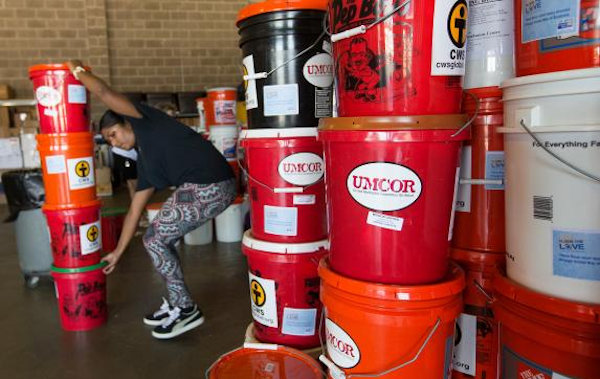UMCOR has granted nearly $2 million in disaster relief to thousands in four states impacted by floods in the U.S.
LINDA BLOOM
United Methodist News Service
Nearly $2 million for disaster response funding for flooding in four U.S. states was approved during the annual fall board meeting of the United Methodist Committee on Relief.
The denomination’s Louisiana Conference received a total of $700,000 to assist with recovery in the southern part of the state, where six trillion gallons of rainwater fell in just three days in August.
“UMCOR is silently working alongside the Louisiana Conference,” said the Rev. Jack Amick, head of UMCOR disaster response, who visited the afflicted area with colleagues Greg Forrester and Mary Andreolli. “We don’t come in and take over, but we come behind and support these partners.”
Tens of thousands of homes sustained extensive damage from the floodwaters, with 20 parishes (the Louisiana equivalent of counties) declared eligible for disaster assistance by the Federal Emergency Management Agency. The funding from UMCOR will support volunteer management and home reconstruction, with additional tool and material resources at each hosting site.
As long-term recovery begins, the funding from UMCOR will “enable the conference to begin the long process of helping individuals and families get back into their homes by making them live-able,” the grant application stated.
Also approved was $500,000 for flood recovery in West Virginia, where historic floods in June damaged or destroyed thousands of homes, along with United Methodist churches and parsonages. The West Virginia Conference will target about 120 vulnerable families living near churches and other facilities to better arrange support for volunteer teams.
Grants addressed two regions of Texas that experienced flooding in 2016. The Texas Conference is receiving a total of $300,000 to help 200 households in 10 counties recovery from flooding that occurred from March to May. A $200,000 grant for the Central Texas Conference is helping with home repairs and case management assisting families affected by extensive flooding in Hood County in early June.
The Mississippi Conference received $250,000 to support its response to March floods that hit the state’s most vulnerable populations. “Due to the lack of insurance and the high degree of poverty in the affected areas, the recovery is expected to take up to two years,” the grant proposal said.
Other small initial grants from UMCOR have addressed damage caused by Hurricane Matthew. Amick left for Haiti, one of the regions hit by the hurricane, after the Board of Global Ministries meeting concluded on Oct. 22.
UMCOR directors also approved grants from the Haiti Emergency Advance — $199, 530 for a microcredit project and $1.84 million for Phase III of the New College Bird project.
Agency in transition
Global Ministries, UMCOR’s parent organization, elected Bishop Thomas Bickerton to serve as the UMCOR chair for the next four years. Roland Fernandes was elected to continue as UMCOR treasurer.
Fernandes and Thomas Kemper, the board’s top executive, currently have direct oversight of the relief agency. Kemper told directors that a new head of UMCOR would be hired eventually.
One of the changes at UMCOR over the past four years was the integration of its separate nongovernmental organization into the agency as a whole. The work of the NGO is now part of the international development unit, which currently has field offices in the Democratic Republic of Congo, Haiti, Sudan, South Sudan and Zimbabwe. Those offices have 200 national staff and 13 international staff.
The number of field offices, which manage grants from external donors as well as church-related grants, has decreased from 13 in recent years as projects have been completed. Four longtime offices — Armenia, Georgia, Sri Lanka and Afghanistan — were closed last year, said Javed Sheikh, who started with the UMCOR NGO in 1998 and is the interim leader for the international development unit.
Projects overseen by field offices include sustainable agriculture, food security, community development, conflict resolution, education, emergency relief, livelihood development, water and WASH (Water, Sanitation and Hygiene) projects.
Global Health, a program area led by Dr. Olusimbo Ige, also makes grants, with some $5.3 million distributed to 29 countries from October 2015 to September 2016, mostly for programs addressing mother and child health.
Some successful health efforts account for only a small part of that total. She pointed to the 2016 HIV Program Report as an example.
Twenty-three grants worth $210,253 were distributed in 15 countries to 67,000 beneficiaries. Among them were 867 mothers living with HIV who received support and services; 218 babies born to mothers living with HIV receiving services; 11,074 people given voluntary HIV counseling and testing and 865 peer educators and facility staff trained.
“What is remarkable here is how so little can achieve so much,” Ige said. “We have a network of people who are driven by passion and love who give their services for free.”
Dealing with disaster
Everyone knows the cost of recovering from disasters has increased, Amick told directors, but the death rate also has jumped. “The number of people dead has surprisingly gone up — tripled — in the last year,” he said, noting there were 7,823 deaths attributed to disasters in 2014 and 22,773 in 2015.
The increased impact, he explained, is due to three factors — dense urban populations, people living in places vulnerable to climate change and more violent conflicts. “Last year, about half of the international grants had something to do with conflict.”
But UMCOR offers hope by:
- Dispensing 123 grants, totally about $9.5 million, so far in 2016 to assist 228,000 people.
- Continuing to provide education on disaster risk reduction, with a plan to offer disaster preparedness in schools next year.
- Providing a “value-added” response by helping partners learn more about humanitarian principles
“We want to respond to as many disasters as we can,” Amick stressed. In addition to those that make front-page news, “we want to respond to the small disasters, the unheard of disasters, the under-reported disasters.”
Last Updated on November 2, 2023

